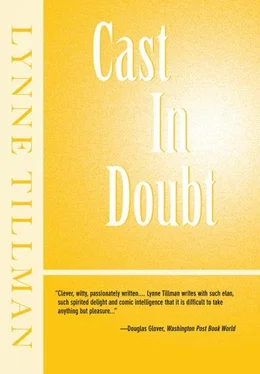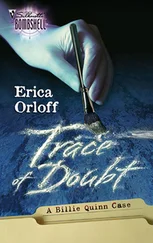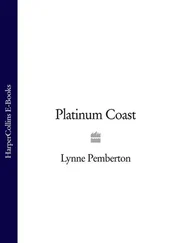I stop prancing just as suddenly as I started, mentally patting myself on the back for bravado, nothing else. I offer to treat them both to a wonderful meal at the only restaurant on the harbor. John hesitates. Is he thinking of Alicia? Gwen notices his hesitation or reluctance. Damned hungry, she declares and grabs me by the hand, pulling me toward the door. This action leaves John standing alone in the middle of the room, with the empty wine bottles on the floor about him. They look like sinking ships.
We must go, I declare to John. John’s hands dangle foolishly from his long thin arms. He himself is in some way dangling foolishly, even dangerously. Ah, I muse waggishly, a pretty boy is considering his options. He must soon come to a decision, having weighed the pros and cons of doing this or that, I suppose. He blinks, clears his throat, but says not a word, and then follows after us penitently, nay, passively. He’s a young man easily led.
Will I be the leader or Gwen? Am I in any condition to lead? Actually the idea of Gwen and me as leaders is marvelous; in our present state, we ought to be inflicted on the public! To Gwen I bellow, in a mock English accent, Where will it all end? Hell, she mutters, just hell. O, what a rogue and peasant slave am I, I answer. I recite this line in the manner of Olivier, I’m almost positive of that. Dear Gwen, perverse Gwen. Perverse me. To dinner we three!
I am losing too many nights, if nights can be lost. How do I love thee, let me count the nights. They do count, whether or not they are lost. Perhaps Gwen and the boy have scooped it up, whatever it was that was lost. I must have been asleep for a generation — accounting for the generation gap — and they have taken my — that — night from me, sharing it between themselves. What a foul idea. I don’t even remember if Roger made an appearance at the restaurant when we three were there. If he did, I think he and Yannis were scowling at each other, quite ferociously. I can see their contorted faces before me. How ugly anger is! John must have deposited me at my door. Or Gwen. Or both. Though for some reason I believe it is unlikely they were together. Something happened between them, I think. Perhaps it will come to me as the day goes on.
The sun glares into the room. The curtains were not drawn. Yannis forgot to do it. I don’t want to open my eyes. Not yet. But even though I think that, I do open them, just to demonstrate to myself that I can think one thing and do another. My small world comes into view — bureau, slice of sky, books on floor, and so on, and I ask myself again: why has Helen disappeared? What is the reason? There must be a reasonable explanation. But I cannot, for the life of me, find one. I am, I decide, obsessed by this, and I know it’s weird, as John might put it. I think he did put it that way, the other day, come to think of it, when I talked to him about Helen. John thinks me strange, I think. Yet I must find the bits that I do not know and join them together into a reasonable, a functional whole. This makes me a sort of quilter on the order of Great-Aunt Sarah, a loathsome woman, but most talented in her homely way.
I am reminded of an unfinished piece of writing about Helen. But where is it? If only Yannis acted as my secretary. I get out of bed and shuffle through some papers and come to it.
We were at the restaurant, at my table. Helen was rubbing her foot. Then she began tapping her foot on the ground in an arrhythmic pattern that annoyed me but I did not complain. She asked about my past, friends, college, Boston, New York, as she did from time to time, and very easily did I relate anecdotes and tales that I believed she enjoyed and which I would not so willingly tell others. Helen was a wonderful listener. One simply felt her appreciation. I told her about a fatal disagreement between two artists, both of whom developed a certain kind of technique or effect. They fought about who did it first and who could claim it. Each was adamant. It ended their friendship. Helen was astonished. What did it matter, she wanted to know, who did it first? I explained that it had to do with originality, with thinking up something first, with being the first to have fostered a new idea, to have changed definitively a field — in art, in science — to have produced a theory or form, which established a new way of thinking, in writing, even a locution, and that that ought to be credited. Helen thought it was funny. She declared that she would never care about something like that. Why did it really matter who did it first; didn’t it only matter that it was thought or done, she wanted to know. I was hard-pressed to get to the heart of it, to why it mattered ultimately. But I elaborated that it was important, for instance, in science, to mark the link from one idea to another, and to give credit where it was due. Human beings strive for immortality, for recognition and acknowledgment, to make their mark, to encourage progress, and to move civilization forward, I went on. Later, we laughed about the fifteen minutes any of us might be given in this regard, but my sweet young Smitty accepts this short span on the stage more readily than do I, I think. Indeed I was winded by the end of my short speech. I waxed and waned with it.
I never finished recording the events of that day and night which we spent together. What did we do that day? I cannot remember now. It’s so odd what one forgets and what one holds and stores inside one, good memories as well as bad ones. The oddest occurrence of all is when a friend remembers much too well an event you have no memory of and yet it struck the friend as worth preserving, consciously or unconsciously, and in the friend’s memory you are a vivacious actor in the scene.
I reread the page. What did it mean really, that conversation with Helen? As a piece of writing it doesn’t seem to fit anywhere. It may not. It does not explain anything to me. But I am not sure. There may be clues in it that are hidden from me. I put it away again but this time place it in a clean new folder which I mark, Questions about Helen.
In the great scheme of unknowable things, Helen’s absence is unimportant, a speck of dust in a vast and unseemly, filthy world. Still, a mystery is a mystery. I rub my eyes; they are coated, a film over them. I cannot see properly. While this may be a metaphor, it is also true that my sight has bothered me for years, and as I age I worry more and more that one day I will not be able to read, that I will go blind, and end life as one of those poor souls with a white cane who is forced to walk the streets waving it in the air about him, a spectacle who cannot see what kind of spectacle he makes. I am susceptible to humiliation, while the people I admire most are indifferent to how they appear to others. Could I, like Milton, train young people to read for me, and would I be as cruel — to teach them to read without understanding? I have no daughters. I nearly thought, I have Helen. How comic, how predictable. Now a pang — a kind of hole — lodges just under my heart, a register of longing or emptiness, which may be the same. This hunger I experience — to be full and whole. Do terribly obese people suffer this in the extreme? Still, why shouldn’t one long for eternal life? Why shouldn’t one crave immortality? Or is this pang an intimation of heart disease?
Immortality is one thread in the quilt. I try in all matters to find the significant thread — or theme — that if pulled would rip apart the sweater, unravel the yarn. It’s why I enjoy writing stories based on real-life crimes. People usually have motives for what they do, foolish ones, perhaps, ones spurred on by the least attractive qualities in men and women. Jealousy, greed. Ignobility. There are always motives in the crime stories I’ve written. Thus I can move from event to event unselfconsciously and with a degree of fluidity: someone wasn’t named in a will and took revenge; he stole his girl; she took a lover and her husband found out, then murdered them both; and so on. A murder is committed or two murders, the second to conceal the first. There is a chain of events, a series of links, and one need merely trace the links back or begin at the beginning, moving forward to the penultimate event, to understand the ultimate one. Increasingly, life is not like this.
Читать дальше












